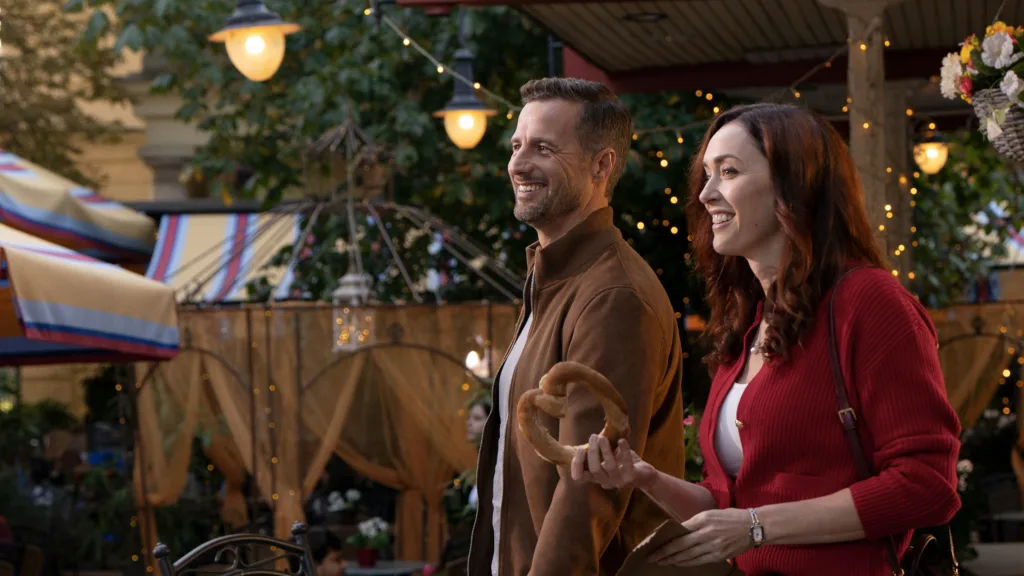In the predictable machinery of professional life, Savannah is a competent cog, a publicist anticipating the upward momentum of a promotion. When that mechanism grinds to a halt and ejects her, the narrative deposits her into a world far removed from corporate structures. Her friend Teddy, a cruise director, extends an offer: a temporary job aboard a ship gliding down the Danube.
This is no ordinary voyage. The vessel hosts “KissCon,” a floating convention for devotees of the romantic comedy, a self-contained universe where fans can brush shoulders with the stars who enact their favorite fantasies. Into this strange ecosystem walks Tripp Nelson, a rising actor burdened by the very fame the convention celebrates.
His discomfort with the spotlight is palpable. Savannah’s task is to manage this reluctant star, to polish his public image. Their first encounter is a sharp clash of his guarded celebrity and her professional purpose, setting the stage on the waters of a manufactured reality.
The Publicity of Affection
The dynamic between Savannah and Tripp is built on a standard conflict. His initial coldness is a shield against the intrusions of a life lived in public. He is presented not as a simple jerk, but as a shy man from a small town who finds the performance of celebrity a heavy costume.
His motivation is grounded in practicality; he must secure a lucrative role to support his family’s ranch. It falls to Savannah, the publicist, to teach him how to project an approachable image. Within these professional sessions, a genuine connection forms. She listens, and he reveals the person behind the persona.
The rapport between Sarah Power’s Savannah and Brendan Penny’s Tripp is not one of fiery passion but of a slow, believable recognition. They find commonality in their separate vulnerabilities. The story’s primary crisis arises when this private bond disrupts public duty.
A missed fan event, a direct result of their time together, gives the event’s sneering organizer the excuse to dismiss Savannah, creating a chasm between her professional failure and their personal success.
The Architecture of Artifice
The film’s setting is its most self-aware element. A romantic comedy set at a romantic-comedy convention creates a curious feedback loop; the movie is constantly commenting on its own construction. KissCon is a space where the tropes of the genre are not just enacted but are the main attraction.
Against this backdrop, the European scenery of Vienna and Budapest scrolls by like a series of handsome, interchangeable postcards, enhancing the sense of a picturesque escape. The antagonist, Liam, functions less as a developed character and more as a narrative device—a personification of the cynical, transactional nature of the entertainment business.
He is the necessary friction against which the central romance must test itself. The supporting cast, from the ever-helpful friend Teddy to the enigmatic older woman who seems to be a permanent resident of this fateful cruise, reinforces the idea that this ship is a place outside of normal life, a stage where destinies are tweaked and romances are forged by unseen hands.
Fulfilling the Formula
At its center, the film examines the tension between a private self and a public identity. Tripp’s journey is one of learning to perform authenticity, to make his genuine nature palatable for mass consumption. The story moves with a comforting predictability, embracing the very conventions KissCon celebrates.
There is the requisite meet-cute, the misunderstanding born of celebrity, a lighthearted comedic bit involving torn pants, and the climactic public declaration. These elements are not signs of creative exhaustion but are instead a deliberate embrace of the genre’s expectations.
The resolution sees Tripp making the requisite “grand gesture,” a public performance of private feeling that ironically solidifies his status as a romantic hero in both his films and his life. The final kiss on the Danube is not merely a happy resolution; it is the story closing its own loop, delivering the exact emotional payoff it promised from the start.
Love on the Danube: Kissing Stars is the third and final installment in Hallmark Channel’s Love on the Danube trilogy. Premiering on Hallmark+ on September 26, 2024, and airing on Hallmark Channel on May 31, 2025, the film follows Savannah Bailey (Sarah Power), a recently laid-off publicist who takes a temporary job managing talent aboard a European river cruise hosting a rom-com convention called KissCon. Filming took place in various European locations, including Budapest, Hungary, as well as parts of Austria and Germany. The movie is available for streaming on Hallmark+ and is also available on DVD.
Full Credits
Director: Peter Benson
Writers: Andrea Canning, Agnes Bristow
Producers: Agnes Bristow, Borga Dorter, Hubert Toint, Mark Vennis
Executive Producers: Leif Bristow, Michael A. McLaughlin
Cast: Sarah Power, Brendan Penny, Kathryn Drysdale, Katie Sheridan, Jonny Weldon, Gerald Kyd, Mark Holden, Catherine Disher
Director of Photography (Cinematographer): Russ Goozee
Editor: Paul Whitehead
Composer: Christopher Guglick
The Review
Love on the Danube: Kissing Stars
Love on the Danube: Kissing Stars is a highly self-aware film that succeeds by fully embracing its own formula. It operates like a well-oiled machine, powered by familiar romantic-comedy tropes, from the celebrity-meets-civilian premise to the requisite grand public gesture. While it offers no surprises, its charm is found in its predictability and the grounded connection between its leads. The movie is a comfortable and competent execution of genre expectations, delivering precisely the clean, satisfying emotional payoff it advertises from the outset, making it a fitting, if unremarkable, conclusion to its trilogy.
PROS
- A believable, low-key rapport between the two main actors.
- The self-referential "KissCon" setting provides a clever backdrop.
- An effective antagonist whose actions simplify the central conflict.
- Pleasing European scenery adds to the escapist atmosphere.
CONS
- The plot follows a deeply conventional and predictable path.
- The main conflict feels manufactured and quickly resolved.
- Supporting characters and side plots lack significant development.
- Relies entirely on established genre formulas instead of offering new ideas.
